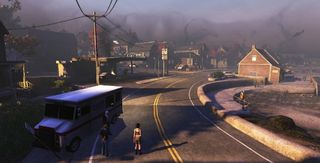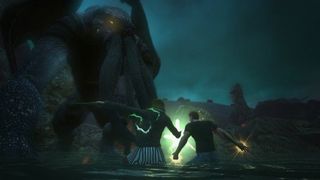Interview: The Secret World's Bylos and Bruusgaard, Pt 1

We've got a giant blowout of Funcom's excellent-looking MMO The Secret World (with exclusive first looks at special missions, dungeons, and PVP) headed your way in an upcoming issue of PC Gamer, but magazines are made of paper. Fickle, fickle paper. Sadly, there are only so many trees in the world, and apparently "but it's for a really great videogame article" isn't an acceptable excuse for widespread deforestation.
However, I spent upwards of an hour quizzing lead content designer Joel Bylos and lead designer Martin Bruusgaard over nearly everything imaginable, and I figured you fine folks might be just a teensy bit interested. So, after the break, you'll find many of the best bits - including balance concerns, how the game's like Lost, lamentations about the lack of difficulty in MMOs, and more - broken up into handy categories.
Dark Age of Camelot Influences
PC Gamer: The first thing that really stands out to me about Secret World is your faction system. It's multi-tiered, you've got three different sides. And you seem to be emphasizing it a lot, you've got the Facebook questionnaire, which is a really cool idea. So is there any inspiration there from the World of Warcraft, Horde-versus-Alliance thing? I don't really think they knew that was going to get so big, whereas you seem to hanging your proverbial hat on it.
Joel Bylos : I think to start with, we talked about three-sided PvP, it's much more interesting than two-sided PvP because you always have the joker in the deck.
Martin Bruusgaard : Everyone talks about Dark Age of Camelot...
JB : Yeah, Dark Age of Camelot is a massive influence in that regard You have the European, the American, and the Asian faction, and that's also very interesting mix, if you want. It doesn't matter where you're from, you can play Caucasian, Dragon, it's not a problem. They all have very different philosophical backgrounds, it's very interesting. Players really identify with parts of these different factions in their own way.
And they almost tie to certain people's attitudes as far as the way they play games. If you think about, you know, Sex Drugs and Rockefeller, they're in there for a good time, smashing things around. The Templars are more ruthless, they're focused, they want to take stuff down. And the Dragon are all about the chaos. I'm running over here, running over there, I'm an explorer. It almost ties to player archetypes in a way. But I think, yeah, it's definitely very intentional, to drive a wedge between these three factions. People can't form guilds with people outside of their faction. So you can't form a cross-faction cabal. That's part of our philosophy.
The biggest gaming news, reviews and hardware deals
Keep up to date with the most important stories and the best deals, as picked by the PC Gamer team.
Build Balance
PCG: One of the big things [at this year's BlizzCon] was the change to their skill system. They're trying to eliminate cookie-cutter builds with their skill trees, these sort of end-all be-all, you have to take these skills or else you made a useless version of your class type of thing. Are you worried about the emergence of that kind of cookie-cutter approach, where people will figure out the skill system and say, if you're not doing this in a certain way you may as well not do it at all?
JB : I think our monsters, in some regard, counter that as well. They require, especially towards the later parts of the game, they require players to bring specific effects. You could say, I've built up this great DPS class, it's awesome. But then the first time you encounter mobs that chain stun you, and you don't have a CC break, then you're gonna die. So that build is not optimal in that situation. We have some very specific areas of the game with specific kinds of monsters that do effects that you just can't beat without bringing certain effects of your own. They're almost like puzzles, I guess. These monsters do this, and you have to look in the build system to counter what they're doing. Or to find a way around what they're doing. It's the same with the heroic dungeons in the game. They require groups to bring certain specific effects to the dungeons or you won't be able to finish them. I guess you could say that it avoids the cookie-cutter of the be-all end-all.
MB : We designed those encounters, especially towards the endgame, to look at the group as an entity instead of looking at what each of those five individual players can bring. Instead we look at, what can this group, or should this group, bring in total? As long as somebody brings that effect it's okay. It doesn't have to be you specifically. I think that's an interesting concept when we're designing these encounters. We said things like, this will require one and a half healers. This will require 0.75 crowd controlling. We don't say you have to have a crowd controller. We need to have a total of X amount of crowd controlling skills in the group.

Faction Differences
PCG: On the quests and side events, how different is each faction? Will people end up doing roughly the same things gameplay-wise, or will it be like, you play through a certain area with one faction, and do completely different things compared to what another faction does?
MB : Each of the three secret societies have very different hubs. When they go home, they go to very different places and their experience there is very different. So they start out here. And then they come to Kingsmouth for instance. And they all play Kingsmouth, it's the same content. But the Send Report button, when you finish something, then you get a message from your secret society, and their feedback to you is very different. Templars will say, oh, that was a great find about the Illuminati in Kingsmouth, that was fantastic, that was good information. If you send it to the Illuminati, they will say, well, that was just a test to see if you have your head screwed on.
JB : Ranking missions, every faction has their own set of ranking missions. They're the spice, we pull players who've been playing Kingsmouth for like 40 hours and say, you know what? You get a phone call, it says you need to come back and do a special assignment for us. That's the spice. They send you out to do something specifically for that faction that's unique to that faction.
And in those missions we often play the factions off against each other, so you might be spying on an Illuminati guy as he does something if you're a Templar, or as a Dragon you might be letting loose some sort of chaos into the Templar headquarters. Things like that. The ranking missions are different, the main storyline diverges and then comes back together and then diverges and comes back together between each of the major areas in the game. I guess that's it. Then there's additional faction... The rewards are all flavored differently depending on the factions.
No Open World PvP
PCG: What are the factions' interactions within the game world like? Do you have any specific setups for world PvP, or is it just like, people run into each other in the field and fight?
JB : We don't have open world PvP, that's important to make a point about. United against the darkness, divided in purpose and pursuit of power. The war zones are where the three factions fight, the battlefields, you played one of them today, are where they'll fight. In the PvE zones there's no fighting between the factions. They can team with each other against the stuff that they're fighting. It's not quite like Horde/Alliance at all in that regard, we let people play together in PvE. Because there's nothing worse than not being able to get a group together. It's important to us that people can play together. But in PvP the gloves are off and everybody runs after each other, kill the guy who wiped your group...
MB : Animosity comes out in the war zones. We have these persistent zones that are always PvP enabled, where you have control points. They're open 24/7, they can hold over 100 players, and you capture these control points. If you manage to capture and hold any of these zones for your secret society, you give benefits to your entire secret society. You can go in there with your guild and take the zone and hold it, and as you're doing that you're giving bonuses to your entire faction, making you guys the heroes. I think that will become a really interesting part of the secret societies and the fighting between them.
JB : It'll become very political over time, which is also interesting. Everyone will start off not knowing each other very well, but as people become notorious, the Illuminati might get a reputation for their ruthlessness and their backstabbing in some of the mini-games.
MB : It's cool, because Templars might control these zones, and then Dragons and Illuminati can say, we're tired of Templars always controlling this. Let's kick them out. They can group up and do that.
JB : Whereas in WoW you sort of see these over-imbalances with Horde/Alliance, you sometimes feel like there's no way we can win this.
Most Popular






